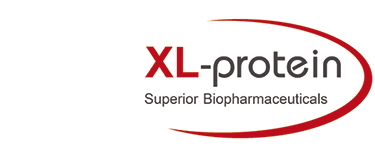XL-protein and Wacker demonstrate high-yield production of PASylated biopharmaceuticals using ESETEC®
Munich / Jena, June 11, 2012 – Wacker Biotech and XL-protein have successfully completed a feasibility study on the production of PASylated therapeutic proteins using WACKER’s ESETEC® E. coli secretion technology. In the study, WACKER technology was used to investigate the production of a PASylated human growth hormone as model protein. WACKER developed a cell line which, utilizing the ESETEC® technology, generated high yields of the PASylated protein. The PASylation® technology enables the development of biopharmaceuticals with extended plasma half-life, thus leading to a new generation of drugs with improved tolerability and requiring less frequent administration due to their longer lasting activity.
The aim of the study was to assess whether clinically established therapeutic proteins that have been improved by PASylation® can be produced in high yields by using state-of-the-art, cost-effective manufacturing processes. The study used WACKER’s proprietary E. coli-based secretion technology to produce a PASylated human growth hormone.
The feasibility study demonstrated that the desired PASylated protein, carrying a 600 amino-acid sequence consisting of proline, alanine and serine, can be successfully produced with ESETEC®. In addition, it also led to an efficient cell line which, during fermentation, secretes the correctly folded, fully functional protein into the culture medium in high yield (3-4 g/l). This is remarkable, as the availability of sufficient quantities of amino acid building blocks from the bacterial primary metabolism for the biosynthesis of large PASylated proteins represented a potential challenge. Moreover, detailed analytical studies showed that the PASylated human growth hormone was produced with high homogeneity in monomeric, non-aggregated form, retaining a remarkably high affinity for its receptor.
Compared to PEGylation, the current standard technology for extending the plasma half-life of biopharmaceuticals, PASylation® has the major advantage of avoiding an expensive and poorly selective chemical modification step during production. Moreover, unlike the chemical polymer PEG, the PAS amino acid sequences are biodegradable and therefore do not accumulate in cells or organs.
ESETEC®, WACKER’s patented E. coli-based secretion system, is a well-established technology for producing proteins and antibody fragments cost-efficiently. It is based on a patented strain of E. coli K12, which is capable of secreting recombinant proteins in their native conformation into the culture broth during fermentation. Secretion into the medium facilitates the purification of the target protein considerably, since complicated process steps such as homogenization and refolding are no longer necessary, making the entire manufacturing process significantly more efficient and cost-effective. A number of biopharmaceuticals (biologics) manufactured with ESETEC® are already being evaluated in preclinical and clinical trials.
According to Dr. Thomas Maier, managing director of Wacker Biotech GmbH, he and his team “are delighted by the early results of our collaboration with XL-protein. PASylation® is an extremely interesting technology for selectively improving the properties of biopharmaceuticals. With our innovative ESETEC® secretion technology, such products can now be manufactured cost-effectively on an industrial scale.”
Prof. Dr. Arne Skerra, CEO of XL-protein GmbH, concurs. “We are extremely satisfied with the results of the feasibility study. This allows us to bypass the expensive in-vitro modification steps as they are required in other processes currently available. The successful combination of our PASylation® technology with WACKER’s ESETEC® secretion technology has a high potential for synergies with respect to the efficient and rapid production of novel therapeutic proteins using an established host organism like E. coli with its well-known advantages.”
